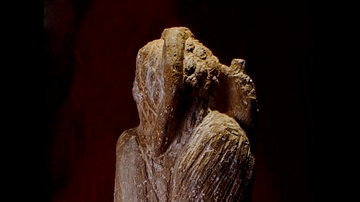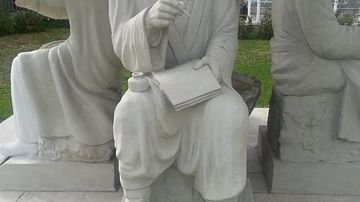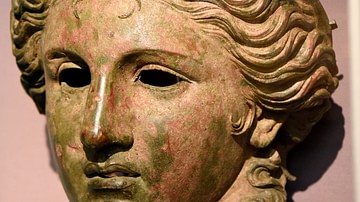Search
Remove Ads
Advertisement
Summary 
Loading AI-generated summary based on World History Encyclopedia articles ...
Search Results

Definition
Ahriman
Ahriman is the evil spirit in Early Iranian Religion, Zoroastrianism, and Zorvanism, Lord of Darkness and Chaos, and the source of human confusion, disappointment, and strife. He is also known as Angra Mainyu (evil spirit or dark spirit...
![Ahriman Statue Side View [2]](https://www.worldhistory.org/img/c/p/360x202/2631.jpg?v=1723047966)
Image
Ahriman Statue Side View [2]
Statue of Ahriman from a Mithraic Temple
Unknown provenance, 1st century BCE - 3rd century CE (not yet on display)
![Ahriman Statue Side View [1]](https://www.worldhistory.org/img/c/p/360x202/2630.jpg?v=1613703602)
Image
Ahriman Statue Side View [1]
Statue of Ahriman from a Mithraic Temple
Unknown provenance, 1st century BCE - 3rd century CE (not yet on display)

Image
Ahriman Statue Front View
Statue of Ahriman from a Mithraic Temple
Unknown provenance, 1st century BCE - 3rd century CE (not yet on display)

Image
Ahriman Statue Back View
Statue of Ahriman from a Mithraic Temple
Unknown provenance, 1st century BCE - 3rd century CE (not yet on display)

Definition
Zorvanism
Zorvanism (also given as Zuvanism, Zurvanism) was a sect of the Persian religion Zoroastrianism which emerged in the late Achaemenid Empire (c. 550-330 BCE) and flourished during the Sassanian Empire (224-651 CE). It is often referenced as...

Video
Iranian/Persian Mythology, Part I, Ahriman, Zoroaster, Ahura Mazda, Mithras, Vayu, Tishtar, Apousha
Fereydoun Kian,(2009) Global Education Va, Vayu, Apousha, Tir, Tishtar, Nas, Nasa, Nasu, Dorooj, these are some of the Iranian Demons in ancient times and they all got incorporated during Sassanid into Zoroastrian texts by the Zoroastrian...

Article
Another Ariamanus Statue Found: The Evil Spirit of Mithraic Religion
It is rare when a new find creates renewed interest in an old subject. Here, the new find is a leontocephaline (lion-headed) figure of unknown provenance, weighing 5.8 kg and 37 cm in height with a width of 14 cm. Its base is partially broken...

Definition
Omar Khayyam
Omar Khayyam (also given as Umar Khayyam, l. 1048-1131 CE) was a Persian polymath, astronomer, mathematician, and philosopher but is best known in the West as a poet, the author of The Rubaiyat of Omar Khayyam. His famous work has been embraced...

Definition
Anahita
Anahita is the ancient Persian goddess of fertility, water, health and healing, and wisdom. Owing to her association with life-giving properties, she also came to be connected with ancient Persian warfare as soldiers would pray to her for...